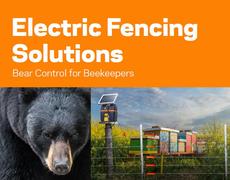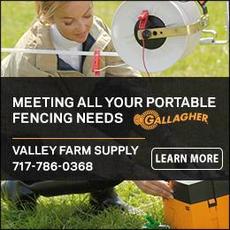August 30, 2014
Key Electric Fence Components
Electric Fence Charger. Sometimes also called an energizer or fencer, the charger needs to be powerful enough to deliver a definite jolt when your horse touches it, even when its current is reduced by vegetation touching the fence line or (as sometimes happens) by moist, dewy early-morning conditions.
Ignore chargers whose power is rated by miles; look instead for one rated by joules, a measure of the oomph with which the charger is pulsing its thousands of volts of current through the fence once every second. One joule is a minimum rating for fencing that encloses up to five acres, but I always recommend getting the most powerful charger you can afford. A higher joule rating doesn't mean the fence's jolt--which can't injure horses or other animals--will be harder or more painful, but that it will be more consistent.
The difference in cost will be insignificant compared to the value of your horses and your peace of mind; expect to pay $100 to $120 for a good one-joule charger that plugs into an outlet in the barn or elsewhere; six-joule chargers now sell for less than $200, a small premium for peace of mind. (Worried about your electric bill? Fence chargers use negligible amounts of power, whatever their rating.) I recommend solar-powered chargers--about three times as expensive as the plug-in type--only for paddocks where 110-volt power is unavailable; as well as delivering relatively low power for their cost, they're susceptible to failure.
It's possible to run insulated cable up to 1/4 mile from a charger to the fence without significant power loss. Install the charger under cover (except for solar-powered chargers, of course), where you can check it easily during each day's routine. Most chargers have a light that flashes with the electric pulse when they're plugged in and functioning.
Ground system. This is a series of three 6-foot-long, galvanized-steel rods pounded into the ground 10 feet apart and connected by insulated cable (see below) to the "ground" terminal on the fence charger. (In areas where soil is very dry, more than three rods may be needed.) Assuming that you have a good charger, the ground system is the key to your electric fence's effectiveness. If your horse touches the fence, he feels a jolt only when the brief pulse of electric current that goes through his body and into the ground is picked up by the ground system and returned to the fence charger, completing the circuit. Be sure to use a ground rod clamp to attach the ground wire as tightly as possible to the rod, rather than just wrapping it around.
Insulated cable. The cable that carries the electric pulse from the charger to the fence needs to be specifically for electric fence, with insulation rated for up to 20,000 volts (most fence chargers emit from 5000 to 10,000 volts)--the same degree of insulation as on automobile spark plugs. By using cable designed for electric fence, you avoid the electricity leakage that results when you connect the charger to the fence with heavy-duty household electric cable, whose insulation is rated for only 600 volts.
When attaching the cable to the fence itself, use a connector clamp rather than just wrapping the cable wire around the fence; cable connected by wrapping comes loose more easily or loses power due to oxidation or corrosion buildup. All fence manufacturers sell a connector clamp designed to work optimally with their product. You'll also need the cable to carry the electric fence current from one side of a gate to the other: Connect all strands of the fence to the cable on the side of the gate nearest the charger.
My preference is to then run the cable above the gate via an archway high enough to safely admit horses and paddock-maintenance equipment, but most people prefer to run the cable underground. That's fine as long as the cable is encased in waterproof plastic tubing, plugged at each end with silicone caulking and buried in an 18-inch-deep trench to protect it from damage by hooves and equipment. On the far side of the gate, use connector clamps to attach all strands of the fence to the cable.
Cut-off switch(es). Save lots of extra steps by installing a weatherproof knife-type cut-off switch (sold in the electric fence section of farm stores) between the insulated cable and its attachment to the fence, enabling you to turn the fence off without going back to the barn to unplug the charger. I also like to install cut-off switches on both sides of a gate--multiple cut-off switches allow you to isolate sections of the fence for easier trouble-shooting.
The fence itself. Visibility is key to an electric fence's effectiveness and safety. Materials such as 1.5- or 2-inch poly tape, braid, rope or coated HT wire make the fence easy for your horse to see and avoid. (Thinner fence materials such as poly wire or 1/2-inch poly tape are suitable for temporary installations or as a "hot wire" to keep horses away from solid fence; uncoated electrified wire--although dangerous when used as a fence material on its own--can also be used to protect solid fence.)
Choose a product with a long warranty (for instance, some fence materials have a guaranteed lifetime of 20 years) and follow the manufacturer's recommendations for number and spacing of strands. A good general rule of thumb is four to five strands of fence, 4 to 4.5 feet high, for perimeter fences and three to four strands for interior fences. Space the top two or three strands no more than 12 to 14 inches apart and the lower strands 18 inches apart, with the lowest strand 18 inches from the ground to minimize interference by grass and weeds.
Insulators. The type of insulator you need (to hold the fence material on the post that supports it, while preventing the fence from contacting any surface that will cause current to leak) is determined by your choice of electric fence; most manufacturers market insulators specifically suited to their fence products. In general, braid, rope, and coated wire are installed on insulators that allow the fence to slide through. To help prevent chafe and wear on a tape fence, however, insulators need to be the type that clamps and immobilizes the tape (especially important in windy areas), and to be installed vertically on the fence post. Avoid cheap "generic" insulators (often made of brittle plastic), which only last a few years.





